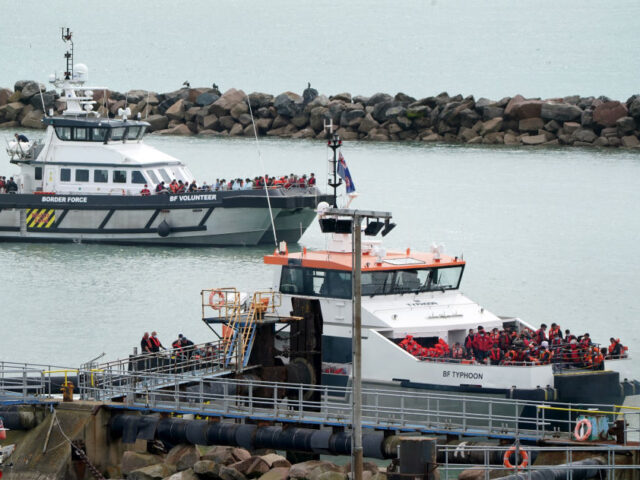July was the busiest month for illegal migrants this year so far, with over 1,000 landing on Britain’s southern shores just last week: just the latest arrivals in a years-long migrant crisis the government has so far proven wholly unequal to.
Some 16,400 illegal migrants have come to Britain through the English Channel route this year so far, with 1,000 in the last week alone.
The surge of arrivals makes July, at 3,683 boat migrants, the busiest month for illegal arrivals this year so far. Crossings have accelerated in frequency, according to statistics published by The Independent.
Arrivals July overtook June as the high-score for the year so far, which had seen 3,136 illegals arrive. Previous experience suggests numbers could continue to rise as the year moves into the Autumn: the all-time record for boat migrant arrivals to the United Kingdom stands at a considerable 6,971 in November 2021.
Despite the remarkable Autumn surge of 2021, the pace of migrant arrivals by boat to Britain is running at twice the pace of last year so far and all indications suggest 2022 will be yet another record year for illegal boat migration.
While boat migration was declared a “major incident” by Britain’s nominally Conservative government back in 2018, the trade of people-smugglers sending migrants across the Channel in small boats really took off in the coronavirus era, when more normal routes like visa overstaying and smuggling at ports became somewhat more difficult due to lockdowns.
While the migrants crossing the Channel in small boats do so illegally, it would be a mischaracterization of the situation to say they were “sneaking” into Britain. Normally, the crossings occur in broad daylight and arey monitored by the French coastguard who inform their British counterparts — but don’t attempt to prevent the he dangerous voyages.
Once the boats are in Brtish waters, the migrants are typically picked up by Border Force, who ferry them ashore to England.
In some cases, the French have been observed handing migrant boats directly over to the British authorities, underlining how these arms of the respective states have become an informal part of the people-smuggling process.
These migrants are, for all intents and purposes, never deported. The huge amounts of money spent by the British government housing and feeding these illegals while also making absolutely no real attempts to turn away or even deter migrants have made headline news for many years, but the government has shown no real interest in rectifying the situation.
That is not to say the public doesn’t want it to, of course. Indeed, 60 per cent of Britons want to see less immigration in general, according to a recent poll. In a country where there is little agreement about anything, 60 per cent saying to reduce immigration is a solid majority: considerably higher than the 52 per cent who voted to leave the European Union, for instance.
While there have been a number of high-profile, eye-catching government initiatives to combat Channel boat crossings, they have had no real impact on the situation and migrant numbers have risen year-on-year.
Cynics may reflect on the probability that destined-to-fail plans like the deal to transfer migrants to Rwanda may simply reflect an admission of former top politician George Osborne, who said of Conservative election-time promises to get migration under control that nobody in the party leadership actually supported reducing immigration and would be glad to see such pledges dropped.

COMMENTS
Please let us know if you're having issues with commenting.